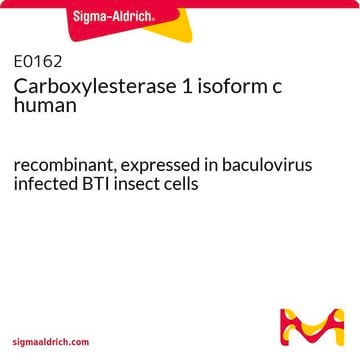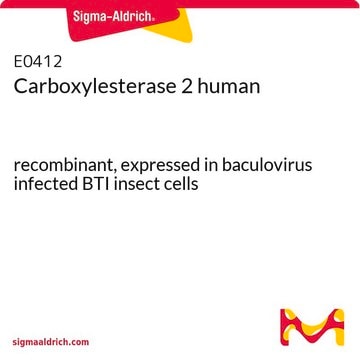B4186
Butyrylcholinesterase human
vial of ≥4 units
Synonym(s):
Acylcholine acyl-hydrolase, Choline esterase, butyryl, Pseudocholinesterase
Sign Into View Organizational & Contract Pricing
All Photos(4)
About This Item
Recommended Products
form
powder
Quality Level
specific activity
≥50 units/mg protein
packaging
vial of ≥4 units
UniProt accession no.
storage temp.
2-8°C
Gene Information
human ... BCHE(590)
Looking for similar products? Visit Product Comparison Guide
Application
BchE, from Sigma, has been used to determine butyrylcholinesterase inhibition by various test compounds .
Butyrylcholinesterase human has been used to study its role as a modulator of pathological features of Alzheimer′s disease (AD) in vivo.
Biochem/physiol Actions
Butyrylcholinesterase (BChE) is a serine hydrolase that shares substantial structural similarities with acetylcholinesterase (AchE) but has different substrate and inhibitor specificities. BChE is found in the serum, hemopoietic cells, liver, lung, heart and the central nervous system of vertebrates.
Butyrylcholinesterase (BChE) is a serine hydrolase that shares substantial structural similarities with acetylcholinesterase (AchE) but has different substrate and inhibitor specificities. It is found in the serum, hemopoietic cells, liver, lung, heart and the central nervous system of vertebrates. BChE hydrolyzes large esters of choline such as butyrylcholine and benzoylcholine. Selective inhibition of BChE activity can be used in the detection of organophosphates. BchE may be used to treat organophosphate toxicity. It is a critical target for Alzheimer′s disease (AD) therapy.
Unit Definition
One unit will hydrolyze 1.0 μmole of butyrylcholine to choline and butyrate per min at pH 8.0 at 37 °C. The activity obtained using butyrylcholine as substrate is ~2.5 times that obtained using acetylcholine.
Analysis Note
Starting material individually donor tested and found negative for HIV I & II antibodies, Hepatitis B surfaceantigen, and Hepatitis C antibodies.
Signal Word
Danger
Hazard Statements
Precautionary Statements
Hazard Classifications
Resp. Sens. 1
Storage Class Code
11 - Combustible Solids
WGK
WGK 3
Flash Point(F)
Not applicable
Flash Point(C)
Not applicable
Certificates of Analysis (COA)
Search for Certificates of Analysis (COA) by entering the products Lot/Batch Number. Lot and Batch Numbers can be found on a product’s label following the words ‘Lot’ or ‘Batch’.
Already Own This Product?
Find documentation for the products that you have recently purchased in the Document Library.
Customers Also Viewed
Butyrylcholinesterase: an important new target in Alzheimer's disease therapy
Greig NH, et al.
International Psychogeriatrics / IPA, 14(S1), 77-91 (2002)
Cholinesterases and engineered mutants for the detection of organophosphorus pesticide residues
Xu YL, et al.
Sensors, 18(12), 4281-4281 (2018)
The apolipoprotein E varepsilon4 allele plays pathological roles in AD through high protein expression and interaction with butyrylcholinesterase
Darreh-Shori T, et al.
Neurobiology of Aging, 32(7), 1236-1248 (2011)
Chengyao Wu et al.
Journal of enzyme inhibition and medicinal chemistry, 36(1), 1860-1873 (2021-08-25)
To discover novel scaffolds as leads against dementia, a series of δ-aryl-1,3-dienesulfonyl fluorides with α-halo, α-aryl and α-alkynyl were assayed for ChE inhibitory activity, in which compound A10 was identified as a selective BuChE inhibitor (IC50 = 0.021 μM for eqBChE
The key role of butyrylcholinesterase during neurogenesis and neural disorders: an antisense-5? butyrylcholinesterase-DNA study
Mack A and Robitzki A
Progress in Neurobiology, 60(6), 607-628 (2000)
Our team of scientists has experience in all areas of research including Life Science, Material Science, Chemical Synthesis, Chromatography, Analytical and many others.
Contact Technical Service









